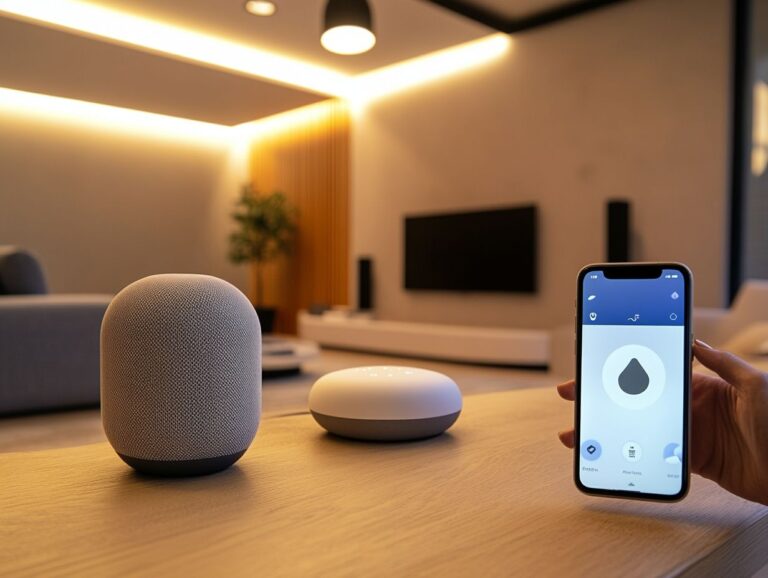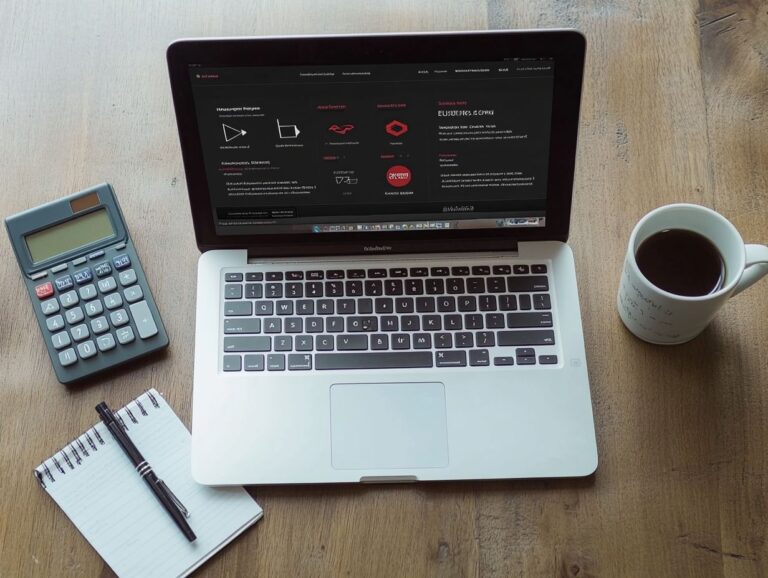Solar Power at Home: A Smart Investment or a Waste?
As energy costs keep climbing and environmental concerns grow more pressing, you might be considering solar power as a viable option for your energy needs.
So, what exactly is solar power, and how does it work? This article dives into the numerous benefits of installing solar panels, from financial savings to the positive impact on the environment.
It also clears up common misconceptions, highlights key factors you should think about before making that investment, and walks you through the steps to install solar panels at home.
Find out if solar energy is a smart investment for your household and join the growing movement toward sustainable living.
What is Solar Power and How Does it Work?
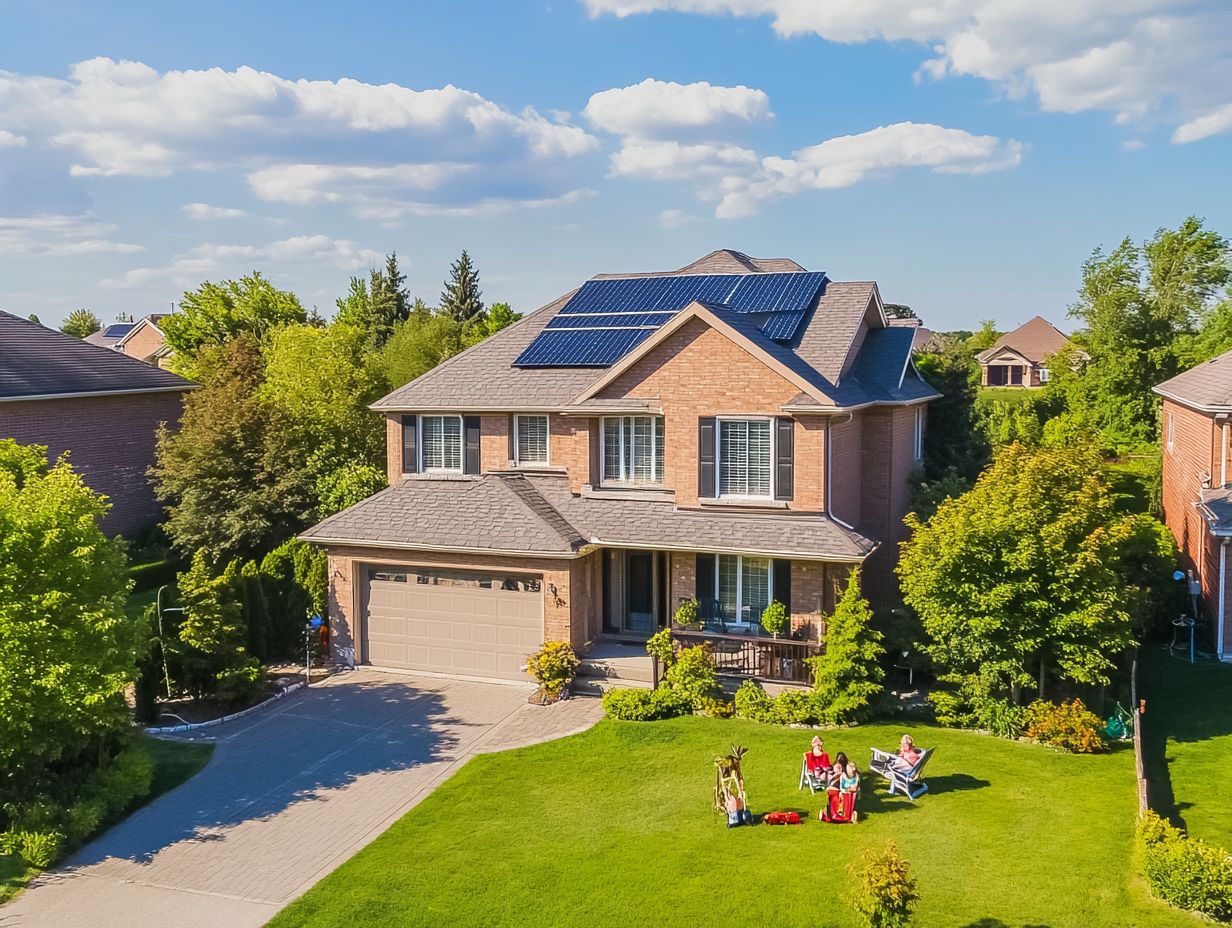
Solar power is a clean and renewable energy source that you can harness from the sun. It works by converting sunlight into electricity using solar panels equipped with photovoltaic cells.
This innovative technology plays a crucial role in the global shift towards sustainability, allowing you, whether you’re a homeowner or a business owner, to cut down on your carbon footprint, lower those pesky utility bills, and take control of your energy use.
Essentially, solar power not only helps the environment but also boosts energy efficiency, making it a savvy investment for your future.
Benefits of Installing Solar Panels
Installing solar panels on your home can give you a ton of benefits. You’ll enjoy significant energy savings and watch your utility bills shrink, plus it can even boost your property’s value while making a positive impact on the environment.
By harnessing solar energy, you can turn your home into a sustainable living space and take advantage of financial perks like solar tax credits and government incentives that really sweeten your return on investment.
And as you produce clean energy, you’re also helping with energy diversification and doing your part in the battle against climate change.
Financial Savings
One of the best reasons to invest in solar panels is the financial savings you can snag. They can really chip away at your electric bills and overall energy costs. By harnessing solar energy, you can cut down on your dependence on utility companies, which means those energy bills could be looking pretty sweet over time.
Plus, with all the solar financing options out there—like solar leasing and power purchase agreements—the initial installation costs become much more manageable, making your return on investment even better.
Thanks to advances in technology, the cost of solar panel systems has dropped significantly, making them accessible to more people. A recent study found that homeowners could save an average of $1,500 each year on their electricity bills after installing solar panels. That’s a solid return on your investment over the lifespan of the system, often surpassing 20 years.
Many areas also offer incentives, like tax credits and rebates, which can make the deal even sweeter.
For example, if you’re in California, you can take advantage of a 26% federal tax credit. That financial boost can really help to lower those upfront costs, making it easier for you to switch to renewable energy.
With such significant savings and the possibility of generating revenue, it’s no wonder more people are jumping on the solar energy bandwagon.
Environmental Impact
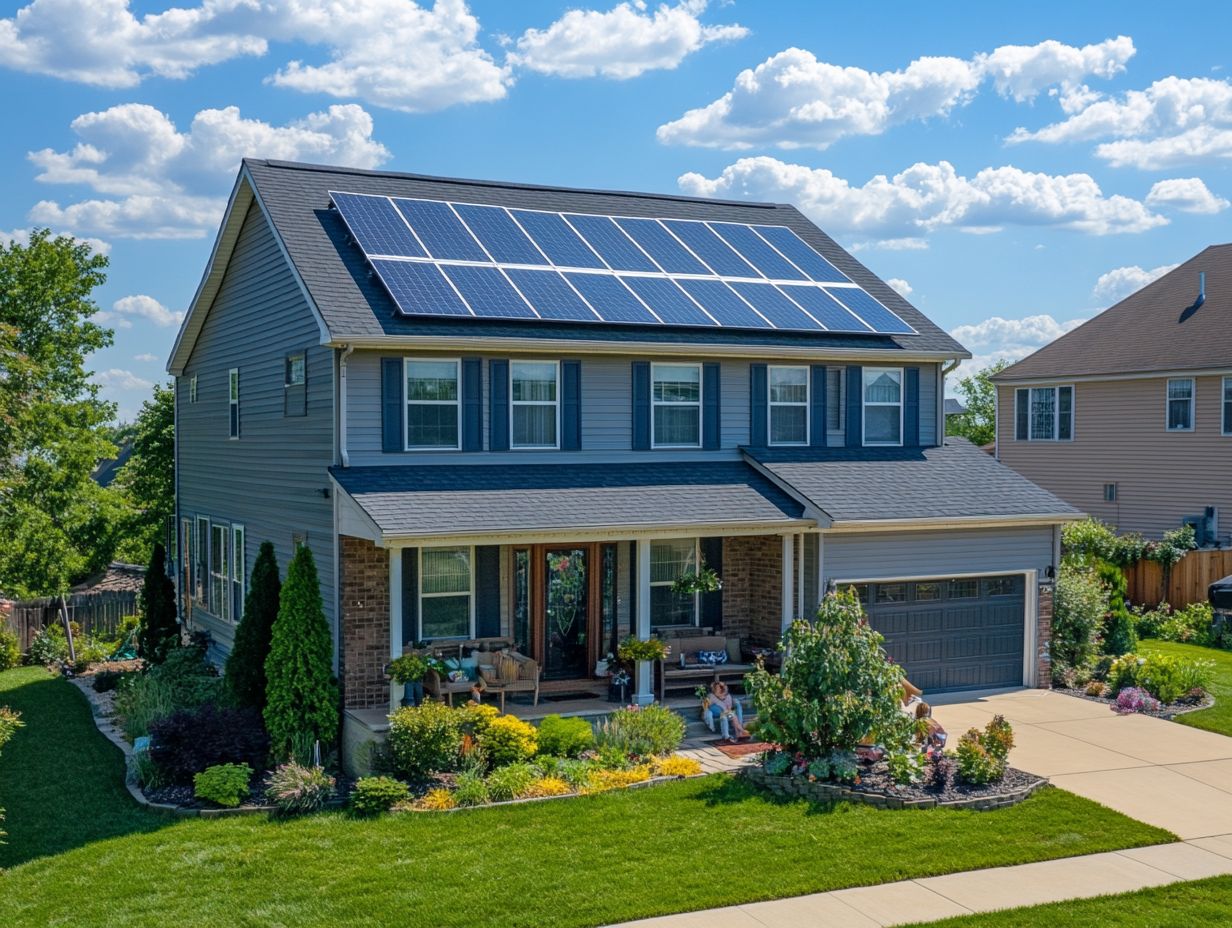
The environmental impact of installing solar panels is incredibly positive. You’ll significantly reduce your carbon footprint and promote sustainability in your energy consumption.
By embracing solar energy, you’re not just helping yourself; you’re contributing to cleaner air and cutting down on harmful emissions, making a real difference in the fight against climate change. This shift to renewable energy aligns perfectly with eco-friendly living and supports global efforts to create a more sustainable planet.
In fact, recent studies show that switching to solar power can cut carbon dioxide emissions by nearly 90% compared to traditional fossil fuels. The solar industry is essential in pushing clean technology forward, driving innovation that leads to more efficient energy solutions.
With each solar panel you install on your home, you help your community reduce its reliance on non-renewable resources, nurturing a healthier ecosystem for future generations.
Embracing solar energy acts as a catalyst for growth in the green economy, encouraging individual responsibility while paving the way for large-scale environmental benefits. It really highlights how urgent it is to shift toward sustainable solutions.
Factors to Consider Before Investing in Solar Power
Before you dive into investing in solar power, there are a few important factors to think about that can really influence your decision and how effective those solar energy systems will be in your home.
From installation costs and maintenance needs to energy audits that check if your home is a good fit, getting a handle on these elements is key to maximizing energy efficiency and making a smooth switch to solar energy.
Each of these factors matters not just for your upfront costs but also for your long-term savings on energy bills and your overall impact on the environment.
Cost and Return on Investment
Understanding the cost and return on investment associated with solar power is crucial if you’re a homeowner thinking about making the switch to this sustainable energy option. Sure, installation costs can vary depending on factors like system size and location, but the potential long-term savings on your energy bills and financial incentives, such as solar tax credits, can really boost your ROI over time.
By checking out different solar financing options, you can get a clearer picture of the long-term economic benefits of going solar.
You might be surprised to learn that many homeowners are finding that their initial investment in solar energy pays off through various savings over the years. For example, people who install solar panels often see their electricity bills drop by as much as 70%, which can save thousands of dollars over the lifespan of the system.
Plus, programs like lease agreements or power purchase agreements (PPAs) let you install solar without the hefty upfront costs, making this green technology much more accessible.
Take California, for instance. State incentives there have really boosted residential solar adoption, leading to significant financial perks for users and even increasing home values.
These real-world examples show not just how feasible solar investment is, but also how appealing it can be as a profitable, eco-friendly option.
Suitability for Your Home
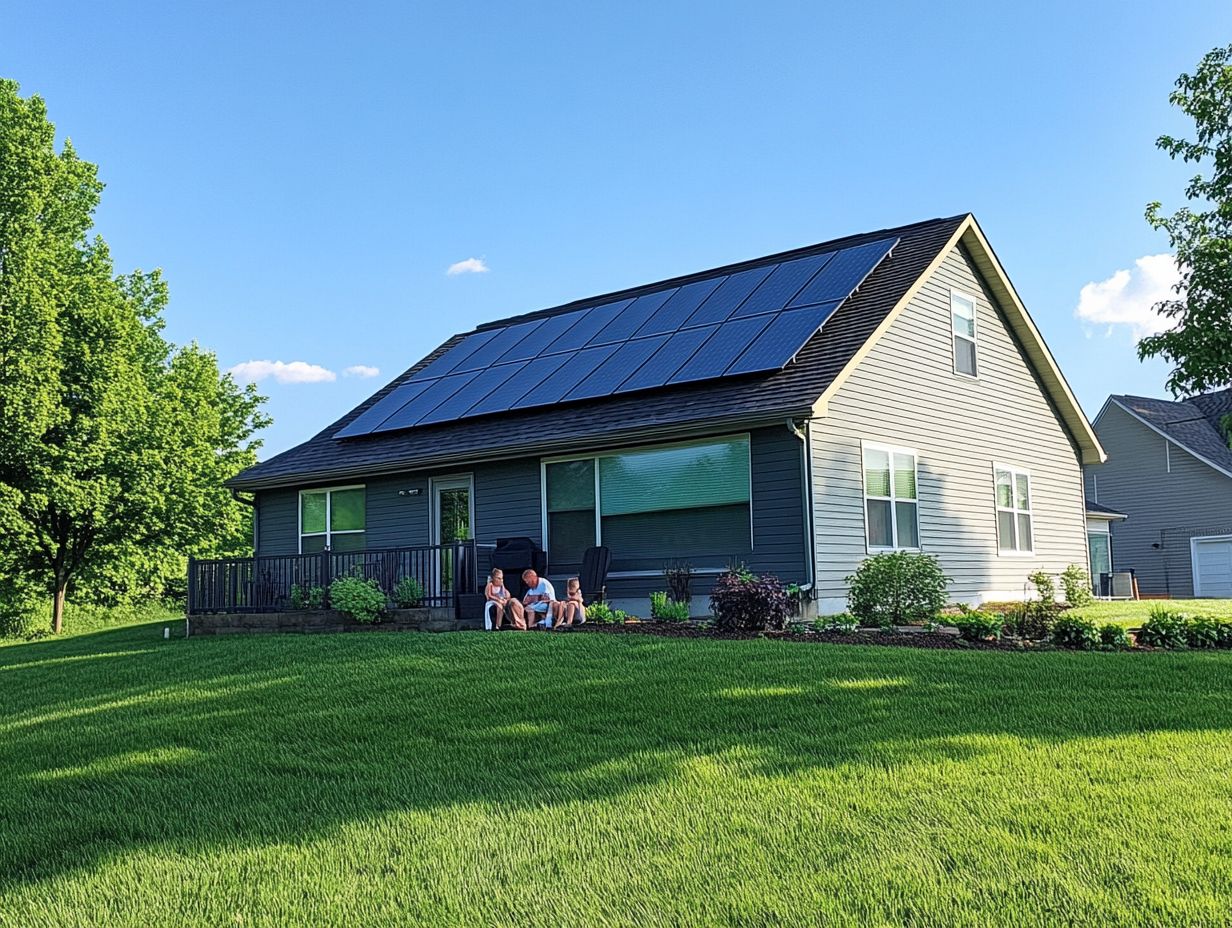
Determining whether solar panels are a good fit for your home starts with a thorough energy audit. This means you’ll need to evaluate your energy consumption patterns and see how much solar energy you could actually produce.
Factors like roof orientation, shading, and the lifespan of the solar panels play a big role in how effective your residential solar system will be. Plus, understanding local regulations and any property tax exemptions can really sweeten the deal by boosting your energy efficiency and long-term savings.
You’ll also want to take a good look at the size and condition of your roof since these elements are crucial for capturing the maximum amount of solar energy. A roof that basks in sunlight all day and is structurally sound is definitely the way to go for solar installation.
Don’t forget to check out the solar incentives in your neighborhood and keep an eye on energy pricing trends—these can really affect your future energy costs and savings.
By gathering this information, you’ll be in a much better position to make informed decisions about the viability of solar power for your home, paving the way for a sustainable and cost-effective energy solution.
Common Misconceptions About Solar Power
You might have some misconceptions about solar power that could hold you back from investing in this sustainable energy solution. Whether it’s myths about how solar energy is produced, concerns over installation costs, or misunderstandings about maintenance and efficiency ratings, it’s important to clear up these inaccuracies.
By tackling these solar power myths and boosting your awareness, you can make more informed decisions. Plus, there are so many advancements in solar technology that make solar energy more accessible than ever!
Addressing Concerns and Myths
Addressing concerns and myths about solar power is crucial for you as a potential investor. It’s easy to hesitate based on misunderstandings about solar energy technology.
For example, you might think solar panels require a ton of maintenance or that they don’t last long, but that couldn’t be further from the truth. Modern solar panels actually have impressive energy production rates and can last 25 years or more with just minimal upkeep, making them a reliable and sustainable energy source.
You might have heard that solar energy is only effective in sunny climates, but that’s a common myth. Thanks to advancements in solar technology, panels are now much more efficient in various weather conditions. Look at countries like Germany and the UK—they’re known for their cloudy skies, yet they’ve successfully harnessed solar energy, proving that it really works even when the sun isn’t shining bright.
By clearing up these myths with solid facts, you can fully appreciate the potential savings on your energy bills and the environmental benefits of making the switch to solar power. Embracing solar energy not only helps reduce carbon footprints but also opens up new paths toward energy independence and innovation.
Steps to Installing Solar Panels at Home
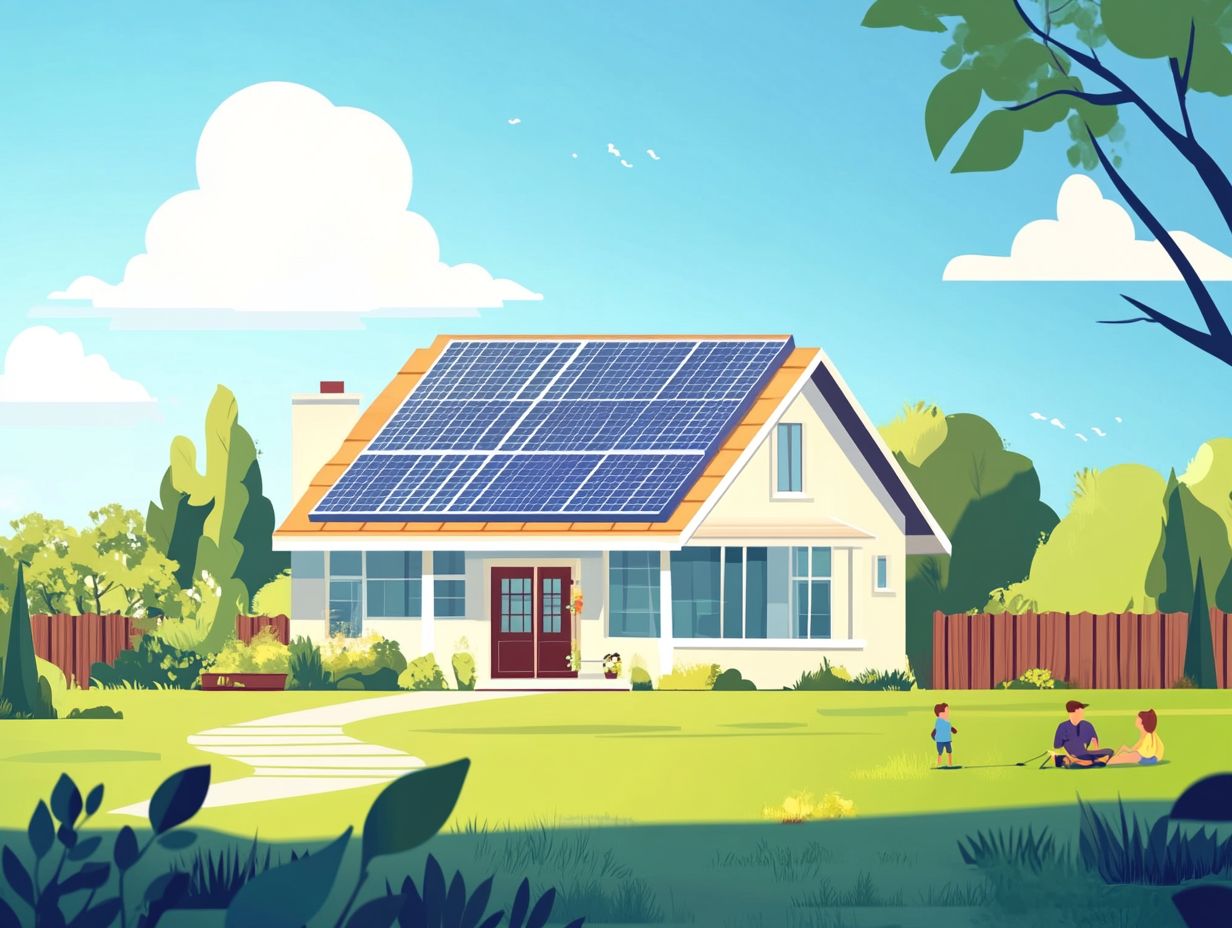
Installing solar panels at home is a multi-step adventure that starts with some careful planning and wraps up with the actual installation of your solar energy system.
You’ll want to assess your energy consumption first and think about whether you prefer grid-tied systems or off-grid solutions.
Once you have a plan in place, it’s time for the installation phase where you can decide whether to hire professionals or dive into the world of DIY solar kits for a more hands-on experience.
Plus, don’t forget about energy monitoring systems; they can help you keep tabs on your solar energy production and make sure you’re getting the most out of your setup.
Planning and Installation Process
The planning and installation process for solar panels is super important if you want to make the most out of your investment in solar energy.
Start by doing an energy audit to figure out your home’s energy needs and find the best solar solutions for you. After that, you can check out financing options that fit your budget, making sure the installation process goes smoothly and lines up with your sustainability goals.
Taking the time for that energy audit not only helps you see how much energy you’re using but also points out areas where you can improve efficiency. This can really boost the performance of your solar system.
Based on what you find, you might choose different sizes or types of solar installations that work best for you. Plus, understanding the financing options, like solar loans or leasing agreements, can help ease the financial load of bringing solar technology into your life.
This thoughtful planning ensures that the whole installation process is seamless and perfectly matches your specific energy needs and financial situation as you dive into the world of renewable energy solutions.
Weighing the Pros and Cons
Weighing the pros and cons of adopting solar energy is key to making a smart decision about your investment. Sure, the financial benefits, like energy savings and cutting down on those utility bills, are pretty tempting, but you also need to think about potential maintenance costs and the initial installation expenses.
By looking at both sides, you’ll get a clearer picture of how solar energy fits with your financial and environmental goals.
Don’t forget about those potential tax incentives and rebates—they can really tip the scales in favor of a more attractive investment in the long run. On the flip side, that upfront investment can feel a bit overwhelming, so it’s crucial to consider how long the solar panels will last and how efficient they’ll be.
Plus, understanding how your local climate affects energy production and the lifespan of the system can be super helpful in deciding whether solar energy suits your lifestyle and financial situation.
In the end, doing a thorough assessment will help you figure out if the long-term savings are worth the initial costs, leading you to make informed choices about your renewable energy investments.


